Dear Berkeley Journalism Community,
Together, we’ve persevered through the pandemic, the racial reckoning and the polarizing election, not only to learn the skills of journalism but to produce important stories. It is with great pride that I highlight, below, the incredible work of our students, faculty, staff, alumni and friends.
But before doing so, on this, the anniversary of George Floyd’s murder, I want to also share with you our deep learning and transformation this past year.
It’s become strikingly evident that who the storytellers are matters. That’s because we all see the world through the prism of our own lived experiences.
If more journalists—and indeed, more industry leaders—were people of color, mainstream media would have recognized much sooner that the cases of Black and brown civilians being killed were not isolated examples of police misconduct.
If more leaders in journalism came from less privileged white families, families that struggled with declining wages and inadequate healthcare, they would have known far sooner of the profound alienation and mistrust of government that fueled Donald Trump’s rise.
Journalism’s mistakes matter for the future of our democracy. We perform an essential public service.
When we tell stories of injustices, we force our leaders to confront these problems, find solutions and implement them.
If we take decades longer than we should to recognize something is a story that requires telling over and over again until our government addresses it, then there is a delayed opportunity to redress problems. The problem festers, and its victims become more and more frustrated. They lose faith in the system—and one another.
When we fail as journalists, it has devastating consequences for the future of democracy.
During my 27 years as a journalist, I’ve worked at some of the best mainstream news organizations in the world. As a woman of Asian Indian descent, as an immigrant raised in Mumbai, I know what it’s like to navigate a working environment dominated by white men, to be passed over for promotions, not to have your story ideas recognized as newsworthy because your editors don’t have the lived experiences to understand that the problems you see so clearly are real.
Last year, as America underwent a racial reckoning after Mr. Floyd’s death, you—our community, rightly demanded that we at Berkeley Journalism do better.
As a woman of color on the faculty at this school, I understood the gravity of those demands and I responded. In fact, it is because I recognized the opportunity of our present moment, that I raised my hand to become dean last year. I am talking about the opportunity to create huge structural change in this institution, change long overdue.
And in many ways, it is because of your support that I became Berkeley Journalism’s first woman to serve in this role.
This past year, I have partnered with you to begin the difficult and important job of transforming not just our school but our industry.
Together, we’ve
· Created a new race and journalism class and recruited a new professor
· Diversified our lecturers with amazing new instructors
· Boosted applications by 44%
· Admitted a class (2023) with about half who identify as people of color
· Created monthly faculty trainings on making classrooms more equitable
· Raised $400,000 for first-generation students and emergency funds for students
· Diversified investigative reporting so half of the program’s summer researchers identify as students of color
Still, there is work to be done.
I have laid out a bold vision for Berkeley Journalism to lead the way in taking the limits off who gets to become a journalist in this country.
Because we know the economics of journalism often don’t work for lower income people, this profession has not attracted large numbers of first-generation students, children of immigrants or people from historically marginalized groups.
So our profession is disproportionately made up of people with backgrounds of privilege.
We want our graduates to leave with as little debt as possible so they can afford to take the entry-level jobs that are stepping stones to careers of enormous power and influence.
Indeed, we are committed to raising an endowment to make our school the first in the country to be tuition free.
To do that, we need to raise $100 million.
And as a first step, we’ve raised five full scholarships this year for students who are first generation. I want to thank Steve Silberstein (BA ‘64/MLS ‘77), John Crowley, Elizabeth Mehren (’69), Taube Philanthropies, Bill Whitaker (‘78) and an anonymous alumni donor for supporting these scholarships.
Thank you, beloved Berkeley Journalism community, for being a catalyst and vital partner in this work.
Partnerships
We’ve also focused this part year on building publishing partnerships. We believe journalists learn best in the act of producing stories, and we know they need published work to get jobs. So forging partnerships has been a top priority.
We have created a new partnership with PBS FRONTLINE to jointly produce investigative projects with our Investigative Reporting Program. The first national broadcast featured two of our students and an alum as reporters. We’ve also forged a new partnership with Berkeley Law’s Human Rights Center for their instructors to jointly teach an investigative reporting class with our faculty. The goal is for students in this class to publish stories in the Associated Press.
Bringing in Our Surrounding Community
We created the Richmond Fellows program with the youth media site, Richmond Pulse. The idea came from students in my class in 2018 that was centered around reporting for our local Richmond Confidential publication. They argued for the School to take a leadership role in embracing would-be journalists in the communities around us and bringing them into our classrooms.
As part of the Richmond Fellows program, we invited two young undocumented people from Richmond into our introductory class in the fall. One of them, Maria Bernal, was so inspired that she applied to join our school full-time and has been admitted into the class of 2023.
Expanding Our Undergraduate Program
We are also big believers in sharing our love of journalism with the broader university community, not only to inspire more young people to become journalists, but also to teach students majoring in other subjects about the basics of journalism so they are smarter consumers of information in this age of disinformation. We made a giant step in this direction this year when campus leadership approved the expansion of our popular summer journalism minor into a year-round offering. I want to acknowledge my predecessor, former dean Edward Wasserman, who conceptualized and campaigned for the year-round minor for years.
Highlights of Our Exciting Events
In honor of Asian Pacific Islander Heritage Month, in May our AAJA student chapter held a special conversation with essayist and cultural critic Jia Tolentino, a staff writer at The New Yorker and the New York Times bestselling author of “Trick Mirror.” The talk was moderated by Injeong Kim (’22) and Gracelynne West (’22). Also in May, the chapter hosted “Deconstructing the Reporting on Anti-Asian Racism and Violence,” with AAJA-SF President Cecilia Lei (‘19), The New Yorker’s Michael Luo, NPR’s Alyssa Jeong Perry (‘16) and Markkula Center journalism ethicist and former Berkeley Journalism ethics lecturer Anita Varma. It was moderated by one of our most unique students, Imran Ali Malik (‘22), who before coming to Berkeley graduated from medical school in Pakistan and was a member of a Muslim punk band that wrote songs and took to social media to combat wrongful portrayals of Muslims in the media.

Geeta Anand interviewing New York Times reporter Edward Wong (‘98) via Zoom April 22, 2021.
In April, we hosted “Journalism on China and U.S.-China Relations: The View from Washington, Beijing and Berkeley,” featuring alum, Advisory Board member and New York Times reporter Edward Wong (‘98), with the Cal Alumni Association’s Chinese Chapter. Watch this important discussion on international reporting on China and the interplay among journalism, public opinion and government policy here. Additionally, Prof. David Barstow moderated a special campus cross-disciplinary “Matrix on Point” panel about objectivity, disinformation, and the construction of truth from a media-consumption (rather than media-production) perspective, focusing on how internet users find information, how algorithms play a deterministic role in search results, and how lies propagate and solidify.
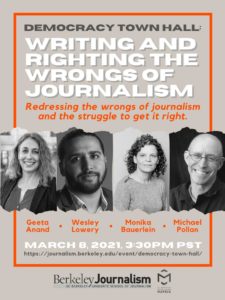 In March, we held a special UC Berkeley Democracy Town Hall, “Writing and Righting the Wrongs of Journalism,” co-sponsored by the Social Science Matrix, with Monika Bauerlein, CEO of Mother Jones; Pulitzer Prize-winning journalist and IRP Special Projects Editor Wesley Lowery, and Prof. Michael Pollan. In honor of Women’s History Month, our NABJ chapter’s co-chair Ande Richards (‘22) moderated a special conversation with Los Angeles Times Assistant Managing Editor and lecturer Angel Jennings and Guardian journalist Abené Clayton (’19) on the importance of Black women in journalism. “The Facts of Being Female: A Discussion of Safety, Equity, and the Future of the Journalistic Gaze,” was hosted by our Women in Media group’s Sasha Hupka (‘22) and Brett Simpson (‘21). The all-star panel of four female journalists gathered for a candid, fearless discussion of their careers and the unique challenges that women continue to face in the media industry. Kimbriell Kelly, Washington bureau chief at the Los Angeles Times, Tamara Keith (’01), White House correspondent for NPR and member of our Advisory Board, Angélica M. Casas (’17), senior video producer at BBC News and Alyssa Schukar, a freelance photographer, journalist and educator, imparted terrific advice to our students.
In March, we held a special UC Berkeley Democracy Town Hall, “Writing and Righting the Wrongs of Journalism,” co-sponsored by the Social Science Matrix, with Monika Bauerlein, CEO of Mother Jones; Pulitzer Prize-winning journalist and IRP Special Projects Editor Wesley Lowery, and Prof. Michael Pollan. In honor of Women’s History Month, our NABJ chapter’s co-chair Ande Richards (‘22) moderated a special conversation with Los Angeles Times Assistant Managing Editor and lecturer Angel Jennings and Guardian journalist Abené Clayton (’19) on the importance of Black women in journalism. “The Facts of Being Female: A Discussion of Safety, Equity, and the Future of the Journalistic Gaze,” was hosted by our Women in Media group’s Sasha Hupka (‘22) and Brett Simpson (‘21). The all-star panel of four female journalists gathered for a candid, fearless discussion of their careers and the unique challenges that women continue to face in the media industry. Kimbriell Kelly, Washington bureau chief at the Los Angeles Times, Tamara Keith (’01), White House correspondent for NPR and member of our Advisory Board, Angélica M. Casas (’17), senior video producer at BBC News and Alyssa Schukar, a freelance photographer, journalist and educator, imparted terrific advice to our students.
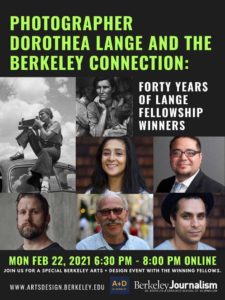 In February, we hosted a special Berkeley Arts + Design event: “Photographer Dorothea Lange and the Berkeley Connection: Forty years of Lange Fellowship Winners,” hosted by Prof. Ken Light, the Reva and David Logan Professor of Photojournalism. The event featured some of the winning pictures and the backstory of the images from the photographers themselves: Clara Mokri (‘21), Wesaam Al-Badry (‘20), Steve Saldivar (‘10) and Tristan Spinski (‘05). Another February event, “Fighting the Disinformation Machine: Social Media and the Future of Journalism,” featured Tristan Harris, star of the 2020 Netflix documentary The Social Dilemma, former Google Design Ethicist, and co-founder of the Center for Humane Technology. If you weren’t able to attend, it’s a must-see.
In February, we hosted a special Berkeley Arts + Design event: “Photographer Dorothea Lange and the Berkeley Connection: Forty years of Lange Fellowship Winners,” hosted by Prof. Ken Light, the Reva and David Logan Professor of Photojournalism. The event featured some of the winning pictures and the backstory of the images from the photographers themselves: Clara Mokri (‘21), Wesaam Al-Badry (‘20), Steve Saldivar (‘10) and Tristan Spinski (‘05). Another February event, “Fighting the Disinformation Machine: Social Media and the Future of Journalism,” featured Tristan Harris, star of the 2020 Netflix documentary The Social Dilemma, former Google Design Ethicist, and co-founder of the Center for Humane Technology. If you weren’t able to attend, it’s a must-see.
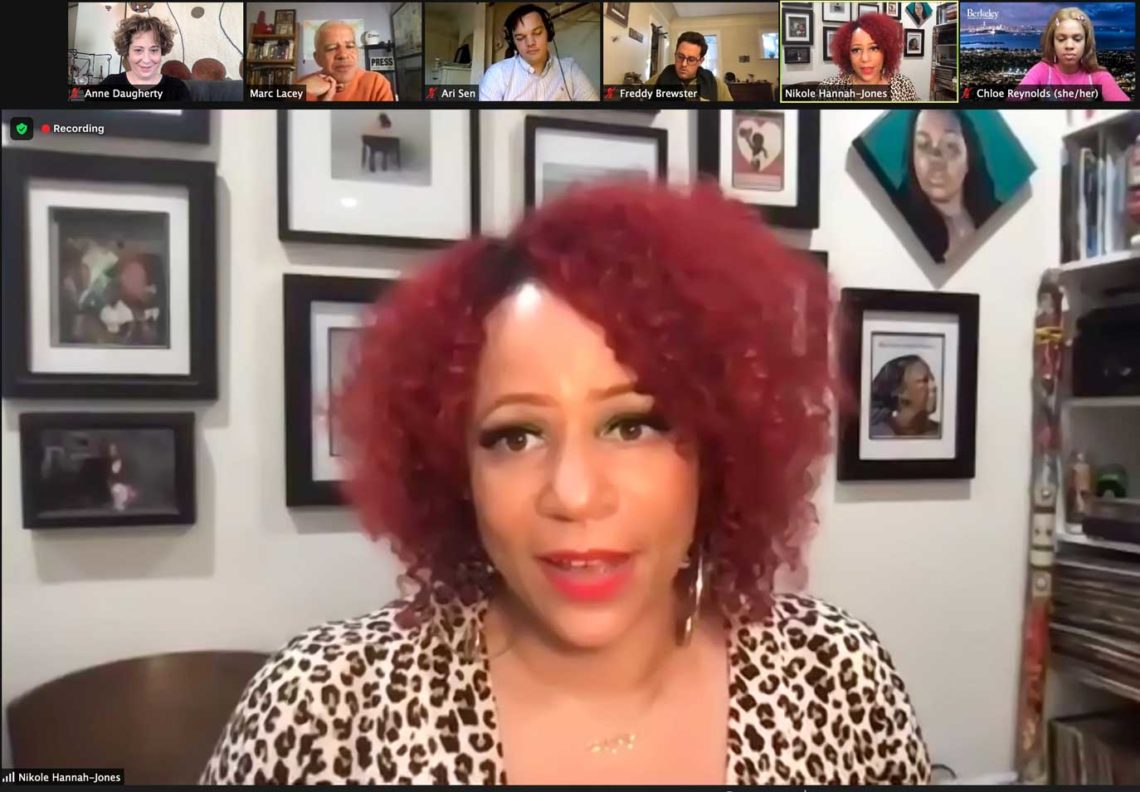
Nikole Hannah-Jones
Many extraordinary journalists routinely visit classes at the School, but one that really got the students excited was Nikole Hannah-Jones’ visit to Marc Lacey’s News Leadership class. She spoke about the 1619 Project, public education choices, and what it’s like to write for The New York Times. A debt of gratitude to those who take time out of their busy lives to inform our students.
Right after commencement, we began the annual Bloomberg-UNC-Berkeley Business Journalism Diversity Program. The diversity pathway enabled by our partnership with Bloomberg aligns so well with our goal to change the face of journalism. Four of our students were part of this landmark program – Maria Sestito (’20), Marco Torrez (‘21) and Sabrina Kharrazi and Coral del Mar Murphy-Marcos (’22). Read about it here.
Student Publishing and Partnerships
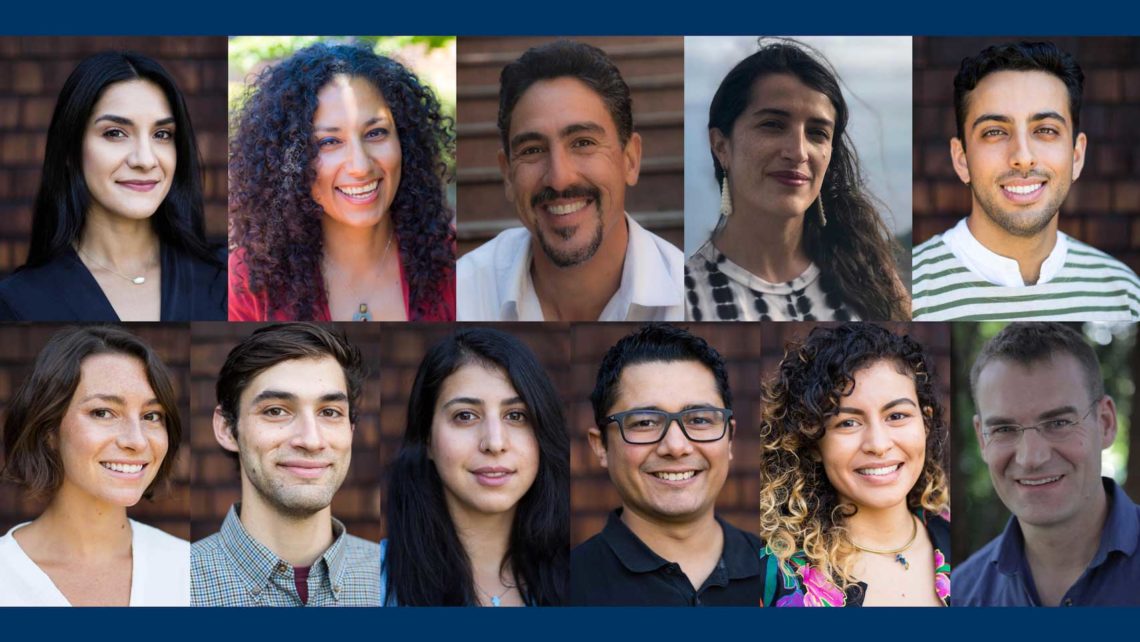
Clockwise from top left: Lulu Orozco (’20), Daffodil Altan (’04), Andrés Cediel (’04), María José Calderón (’09), Brandon Yadegari (’20), Zachary Stauffer (’08), Jess Alvarenga (’20), Pedro Cota (’20), Rosa Tuirán (’20), Nick Roberts (’20), Molly Forster (’20).
A faculty and alumni-led FRONTLINE investigation into COVID-19’s impact on agricultural workers was honored with a Scripps Howard Award for excellence in investigative reporting in April, and nominated for a Peabody Award in May. Read about all of our alumni nominees here.
The film was produced and reported by a host of Berkeley Journalism alumni, both instructors and recent graduates. “COVID’s Hidden Toll” was written, directed, and produced by Daffodil Altan (‘04), a Berkeley Journalism lecturer and FRONTLINE producer and Professor Andrés Cediel (‘04). It was co-produced by María José Calderón (’09). 2020 graduates Brandon Yadegari, Lulu Orozco, Nick Roberts, Rosa Tuirán, Jess Alvarenga, and Pedro Cota were associate producers, with Molly Forster contributing additional research. Lecturer Zachary Stauffer (’08) contributed additional camera work.
Student News
In January, Chloe Reynolds (’21)—a multimedia student studying motion graphics, coding and data visualization—was brought onto a team of New York Times reporters tracking the spread of COVID-19 through 3,000 correctional facilities. Their findings were stunning.
Audio, multimedia and investigative reporter Gracelynne West (‘22) was named the 2021 Chauncey Bailey Fellow at Berkeley Journalism. The fellowship, established in 2012 by then-lecturer Alan Mutter and his wife Lynn St. Albus, is awarded to a student who demonstrates the potential for leadership in promoting cross-cultural understanding and seeks to use journalism to shed light on racial and ethnic injustice. It honors Chauncey Wendell Bailey Jr., the editor of the Oakland Post, who was murdered on Aug. 2, 2007 while reporting on a story in Oakland.
Brian Howey (’22) was awarded an SPJ NorCal Award for his reporting on and critique of San Francisco’s systems supporting the homeless during the coronavirus pandemic, for the San Francisco Public Press.
Visual journalist Clara Mokri (’21) and filmmaker, photographer and journalist Rosa Tuirán (’20) (originally scheduled to attend in 2020) were selected for the 2021 New York Times Student Journalism Institute.
Katie Bernstein (‘21) was named the Brian Pollack Fellow in documentary filmmaking. The fellowship is awarded annually to a promising 2nd-year documentary film student with a passion for tackling social justice issues and exploring the outdoors, selected by a committee overseen by the prestigious program’s faculty.
 Injeong Kim (’22) was awarded a scholarship from the Association of Foreign Press Correspondents. Injeong is one of seven international journalists completing their master’s level studies in the U.S. selected.
Injeong Kim (’22) was awarded a scholarship from the Association of Foreign Press Correspondents. Injeong is one of seven international journalists completing their master’s level studies in the U.S. selected.
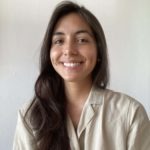 Coral del Mar Murphy-Marcos (’23)—a bilingual reporter from Puerto Rico—was named the Carr Fellow in Business at the New York Times and received a White House Correspondents Association scholarship.
Coral del Mar Murphy-Marcos (’23)—a bilingual reporter from Puerto Rico—was named the Carr Fellow in Business at the New York Times and received a White House Correspondents Association scholarship.
Brett Simpson (’21)—a print and audio investigative journalist focused on health and the environment—was named a 2021 Overseas Press Club Scholar for her reporting on mining in northern Norway and the impact of marine waste disposal on the native fishing industry. It follows her 2021 Human Rights Center Fellowship to cover the same communities facing the dual threats of global climate change and development projects.
Amalya Dubrovsky‘s (’21) thesis project on the chief of Oakland’s Department of Violence Prevention—established in 2017 to address and help people impacted by the city’s chronically high and devastating homicide rate—was published by Oaklandside.
Skyler Glover (‘21) was awarded a CNN Film School fellowship pairing four university students with CNN producers for one-on-one mentorship sessions between now and December 2021. Their final productions will appear on the CNN Film School website and a screening event will take place later this year.
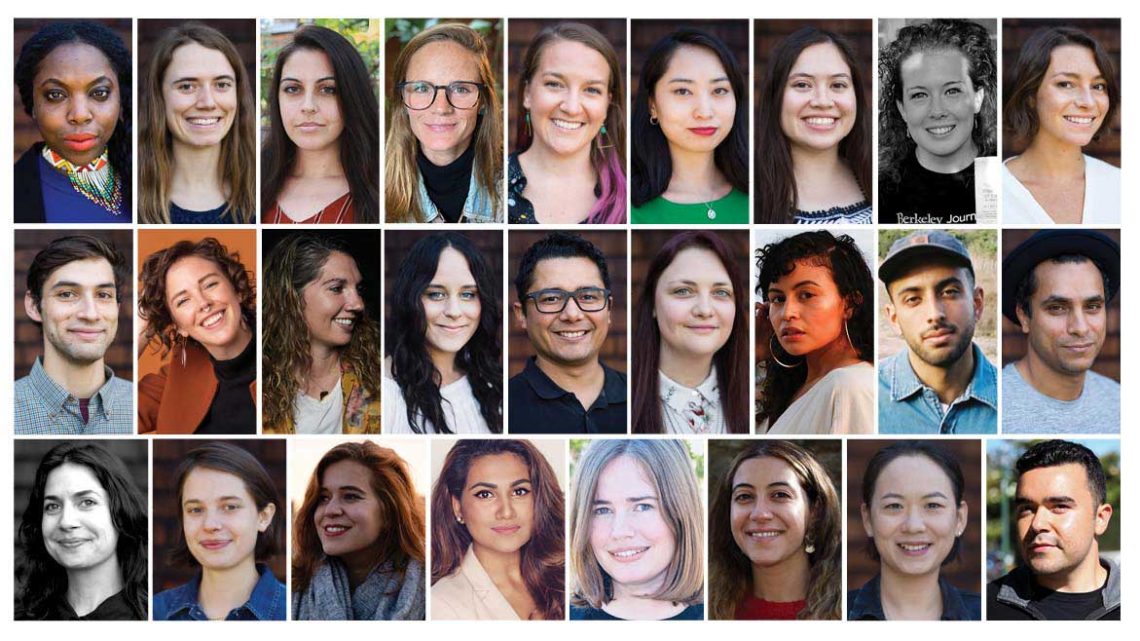
Top row, left to right: Angélica Ekeke, Ashley Omoma [not pictured], Erin Banks Rusby, Nisha Balaram, Mara Kardas-Nelson, Sarah Trent, Shuang Li, Jennifer Cortez, Casey Smith. Middle row, left to right: Molly Forster, Nick Roberts, Rachel Mueller, Meg Shutzer, Tessa Paoli, Pedro Cota, Orion Rose, Jess Alvarenga, Brandon Yadegari, Wesaam Al-Badry. Bottom row, left to right: Katie Bernstein, Ellie Lightfoot, Natalia Gurevich, Aashna Malpani, Stephanie Penn, Deena Sabry, Ying Zhao, Daniel Roman.
Faculty Publishing/Awards
Prof. Ken Light—a beloved teacher, colleague and mentor to innumerable alumni who has taught at the School since 1983—was awarded a prestigious Guggenheim Fellowship. Ken is among 184 artists, writers, scholars, and scientists chosen through a rigorous peer-review process from almost 3,000 applicants. Ken’s photojournalism project will document the aftermath of the 2020 presidential election and focus on the swing states of Wisconsin, Michigan, Pennsylvania, Indiana, and Ohio. The announcement follows a deal for his new book “Course of the Empire” with Steidl, one of the most prestigious fine art book publishing houses in the world.
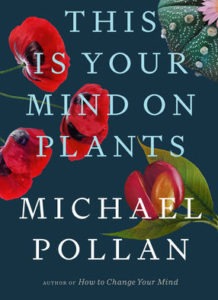 Bestselling author and Prof. Michael Pollan’s latest book “This Is Your Mind on Plants”—a unique blend of history, science, memoir, as well as participatory journalism—is available for preorder now.
Bestselling author and Prof. Michael Pollan’s latest book “This Is Your Mind on Plants”—a unique blend of history, science, memoir, as well as participatory journalism—is available for preorder now.
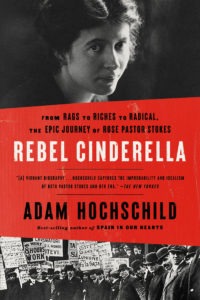 Lecturer Adam Hochschild (and his former student Ben Hubbard (‘08)) made the “longlist” for a book prize for best biography, awarded by PEN America. Hochschild, the best-selling author of “King Leopold’s Ghost: A Story of Greed, Terror, and Heroism in Colonial Africa,” was nominated for “Rebel Cinderella: From Rags to Riches to Radical, the Epic Journey of Rose Pastor Stokes”.
Lecturer Adam Hochschild (and his former student Ben Hubbard (‘08)) made the “longlist” for a book prize for best biography, awarded by PEN America. Hochschild, the best-selling author of “King Leopold’s Ghost: A Story of Greed, Terror, and Heroism in Colonial Africa,” was nominated for “Rebel Cinderella: From Rags to Riches to Radical, the Epic Journey of Rose Pastor Stokes”.
Prof. and former Dean Edward Wasserman reports in Mother Jones about the ethics of recent disclosures in the New York Times about the 1971 publication of the Pentagon Papers. Additionally, he penned a column for the San Francisco Chronicle on how the news media must reclaim the role they are supposed to play by reporting on the conditions that define, obstruct or enrich the lives of the people they exist to serve.

Jennifer Redfearn
Prof. and Oscar-nominated director Jennifer Redfearn’s latest film APART—about three unforgettable mothers caught between drug sentencing, rising incarceration for women and the transition home—premiered at Hot Docs in April. The film had its Midwest premiere at the Cleveland Film Festival and its New York premiere at the Human Rights Watch Film Festival in May.
Lecturer Mark Schapiro was invited to write the afterword in a book on climate journalism to be published by Routledge in July. The book, “Climate Change and Journalism: Negotiating Rifts of Time,” includes articles from scholars around the world probing into the challenges presented to journalism by the epic time-frame of climate change. Schapiro, who has investigated the financial, political, ecological and agricultural dimensions of climate change, and its inequitable implications, concludes the book in his Afterword: Finding the Stories in the Big Climate Storm: “The very phrase ‘climate journalism’, he writes, “[is] a bit of a misnomer. To do journalism today in any field is to be reporting in an arena that is being reshaped, distorted, changed by the changing climate. There are thousands of climate stories a day.”
ArtNews in February named alum/lecturer Marilyn Chase’s (’73) book, “Everything She Touched: The Life of Ruth Asawa” among the five most compelling artist biographies.
Lecturer James Fahn argues in The Engineer, UK that we need a global debate on geo-engineering, both because it could help ameliorate some of the effects of climate change, and because it is “so risky.”
Our Excelling Alumni
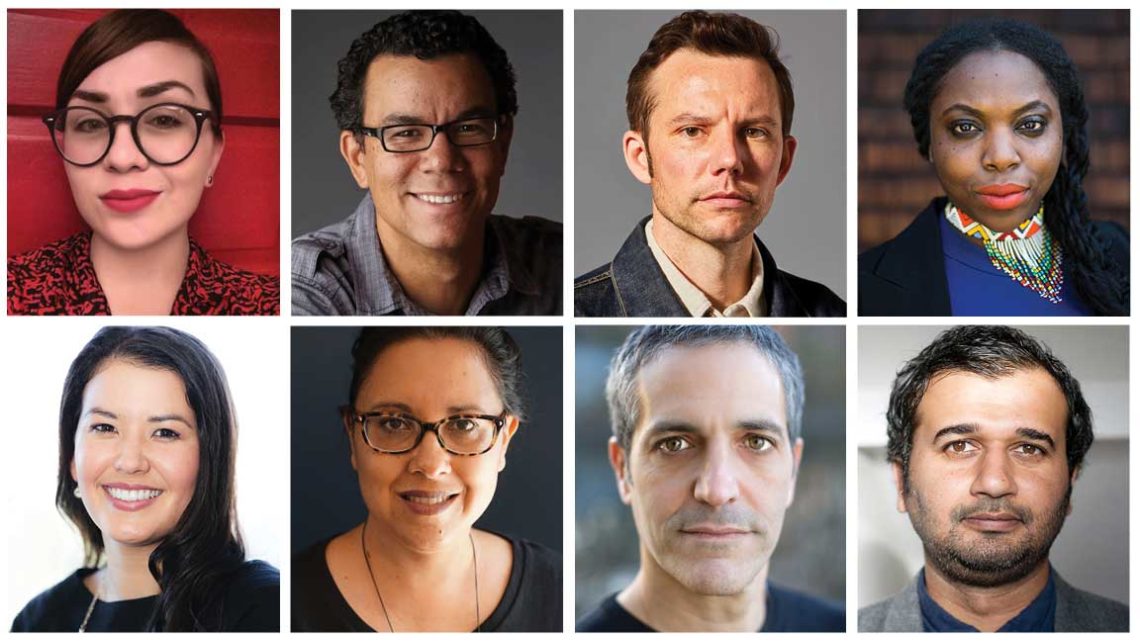
From top left: Gaby Arvizu (’16), Pete Nicks (’99), Sean Havey (’14), Angèlica Ekeke (’20), Lauren Kawana (‘14), Carrie Lozano (‘05) Sam Green (’93) and Adithya Sambamurthy (’10).
Eight alumni were featured prominently at this year’s Sundance Film Festival. Four were producers on new cinema vérité documentaries on education equity, two pushed boundaries presenting live performances, one was a story producer and editor on a documentary short about a Native Hawaiian queer slam poet, and one recently joined the Sundance Institute as part of the leadership of its Documentary Film Program. Congratulations Pete Nicks (’99), Sean Havey (’14), Gaby Arvizu (’16), Angèlica Ekeke (’20), Lauren Kawana (‘14), Carrie Lozano (‘05) and Sam Green (’93).
A Berkeley Journalism emeritus professor, current student and alumni were nominated for a Goldsmith Prize for Investigative Reporting. The work of lecturer Abbie VanSickle and researcher Michelle Pitcher (’21) was one of six finalists. Emeritus Professor Lydia Chávez as well as alums Molly Oleson (’13) and Stephen Hobbs (’14) were semi-finalists. Read about their investigations here.
Recent graduates Angèlica Ekeke (‘20) and Brett Simpson (‘21) were selected as Food & Farming Fellows, even as we established a new, concurrent fellowship for a Berkeley Journalism graduating student funded by renowned chef and humanitarian José Andrés. Prof. Michael Pollan, the John S. and James L. Knight Professor of Journalism, established the program in 2013 through a grant from the 11th Hour Project, a program of The Schmidt Family Foundation, led by our alumna Wendy Schmidt (’81).
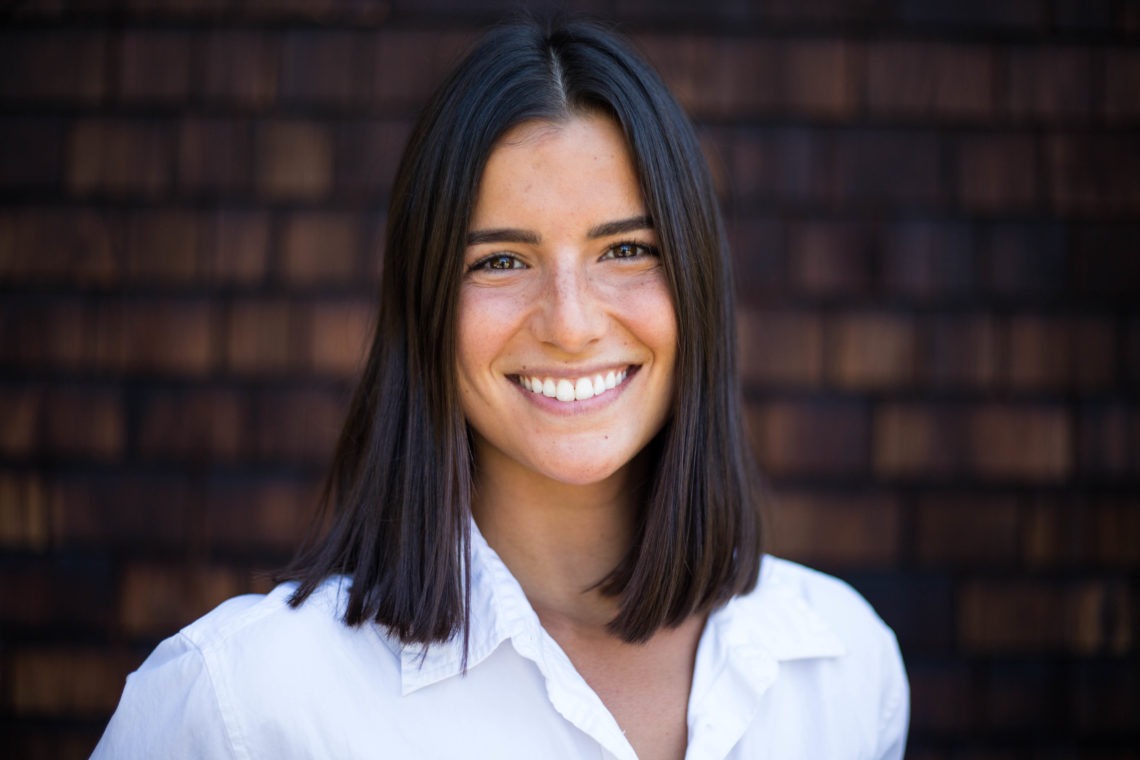
Laurence Du Sault (’20)
Laurence Du Sault (’20) of Open Vallejo was named one of three ProPublica Local Reporting Network Fellows reporting on law enforcement and public corruption.
Celebrating our alums is a very important part of our community. Part of doing so includes our Alumni Portrait series. The most recent alums featured are Alyssa Jeong Perry (’16) of NPR’s “Code Switch”, investigative environmental reporter Jimmy Tobias (‘16), Zainab Kahn (‘16), the “instinctively reflective and erudite” audience strategy editor for video at the New York Times who also serves on our Advisory Board, and Parker Yesko (’16), whose work just two years out of journalism school would help to overturn a murder conviction and set a man free.
Pulitzer Prize finalist Brett Murphy (’16), an investigative reporter at USA Today, was named to Forbes’ 30 Under 30 list.
Documentary short “Miss Panama”—produced and edited by Melina Tupa (’16)—was selected for the 2021 Tribeca Film Festival.
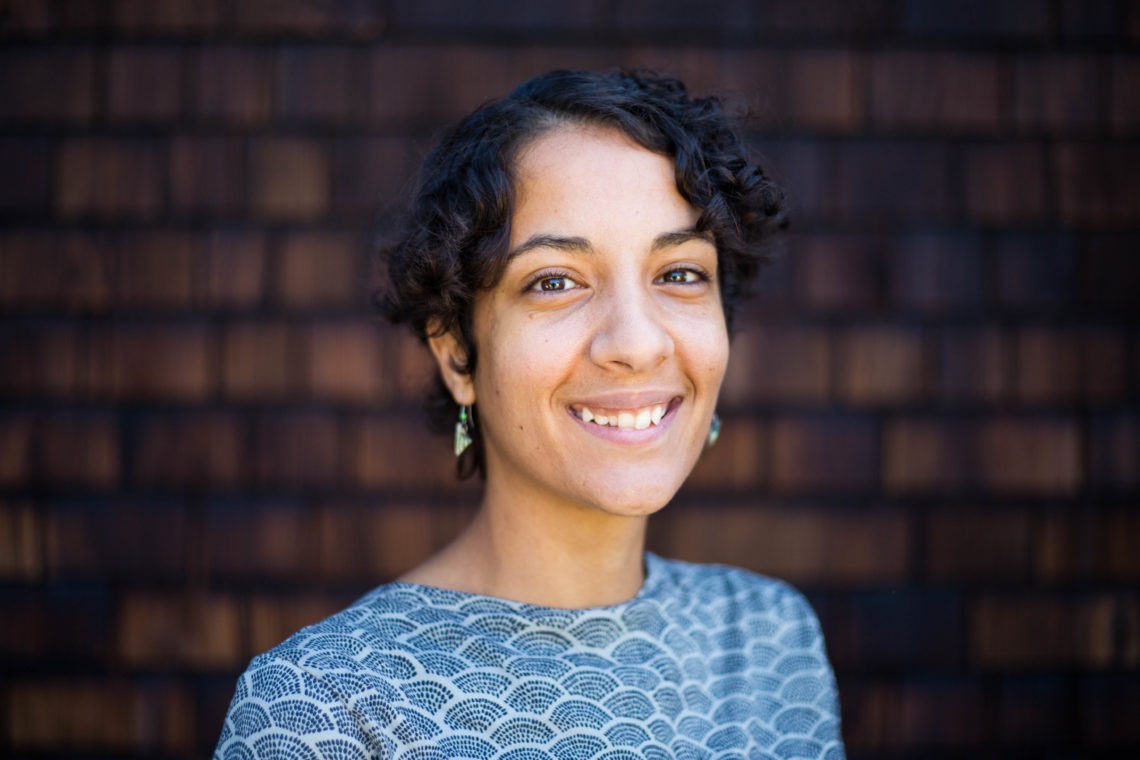
Amy Mostafa (’20)
Visual forensics reporter Sarah Cahlan (’19) of the Washington Post was part of the 2021 duPont-Columbia Award-winning team that reconstructed the clearing of unarmed protesters and reporters from Lafayette Square in Washington.
Amy Mostafa (’20) was part of the production team at Reveal that recently won an IRE Medal for “American Rehab,” a serial audio series that uncovered a long-standing nationwide system of unpaid labor at drug rehabs.
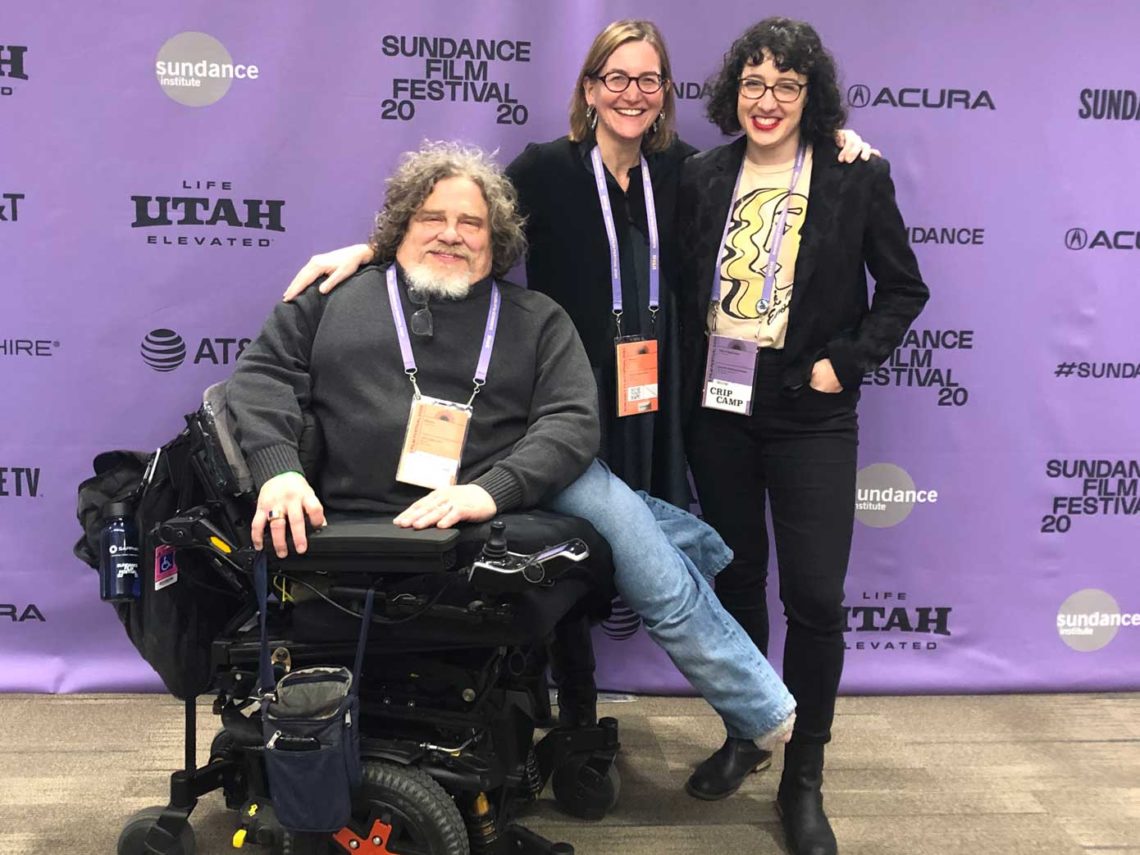
“Crip Camp” Co-Directors Jim LeBrecht and Nicole Newnham with Lauren Schwartzman (right) at Sundance.
Lauren Schwartzman (’18) was among eight alums receiving credit on Oscar-nominated “Crip Camp.” Schwartzman was the associate producer and assistant editor. Mario Furloni (‘11) and Zachary Stauffer (‘08) provided additional cinematography. Others contributing included Mary Newman (‘18), who provided additional production support, and Spencer Silva (‘18), Liliana Michelena (‘18), Emma Schwartz (‘19) and Brian Krans (‘18) who each had a hand in fact-checking.
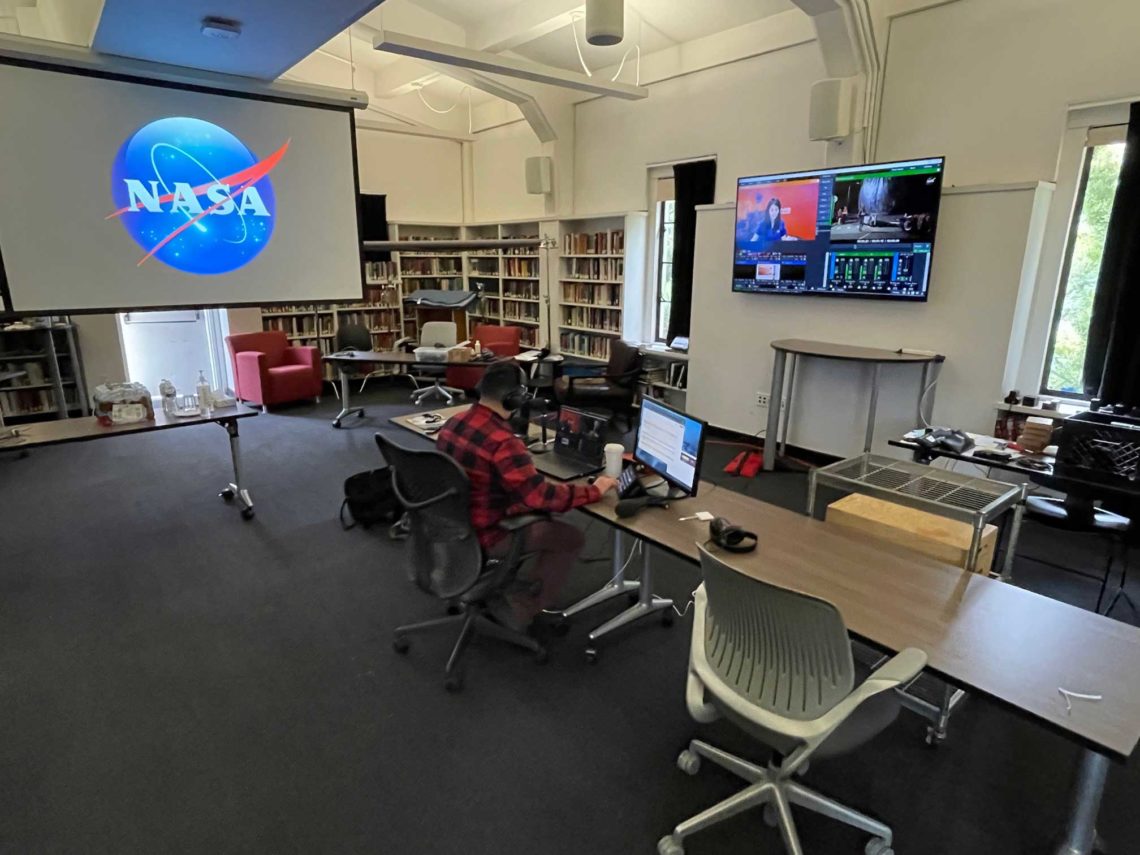
Pedro Cota (‘20) producing the NASA en Español broadcast of the Perseverance landing on Mars—NASA-National Aeronautics and Space Administration’s *first ever* Spanish-only broadcast of a planetary landing—from Berkeley Journalism.
Emma Brown (’09)—an award-winning investigative reporter at the Washington Post—has a new book out about raising boys after #metoo: teaching them the skills to build healthy relationships with girls and women, with other boys and men, and with themselves.

Shuang Li (’20)
Shuang Li (’20) won the Jury Award for Best Asian American Student Filmmaker for her thesis documentary “The Long Wait”—about three Chinese women claiming their reproductive rights—at the Directors Guild of America’s 26th Annual Student Film Awards.
Laurel Rosenhall (‘02) of CalMatters was named Journalist of the Year by the Sacramento Press Club. The judges honored her “tenacious reporting” and public records use to hold politicians and other powerful people accountable for their decisions and actions.
Ben Hubbard’s (’08) book “MBS: The Rise to Power of Mohammed bin Salman,” was named a finalist for the PEN/Jacqueline Bograd Weld Award following terrific reviews last year, including being named one of the best books of the year by the Financial Times, Foreign Affairs and Kirkus Reviews.
Investigative journalist Jude Joffe Block‘s (’10) new book, “DRIVING WHILE BROWN: Sheriff Joe Arpaio versus the Latino Resistance,” was released in April.
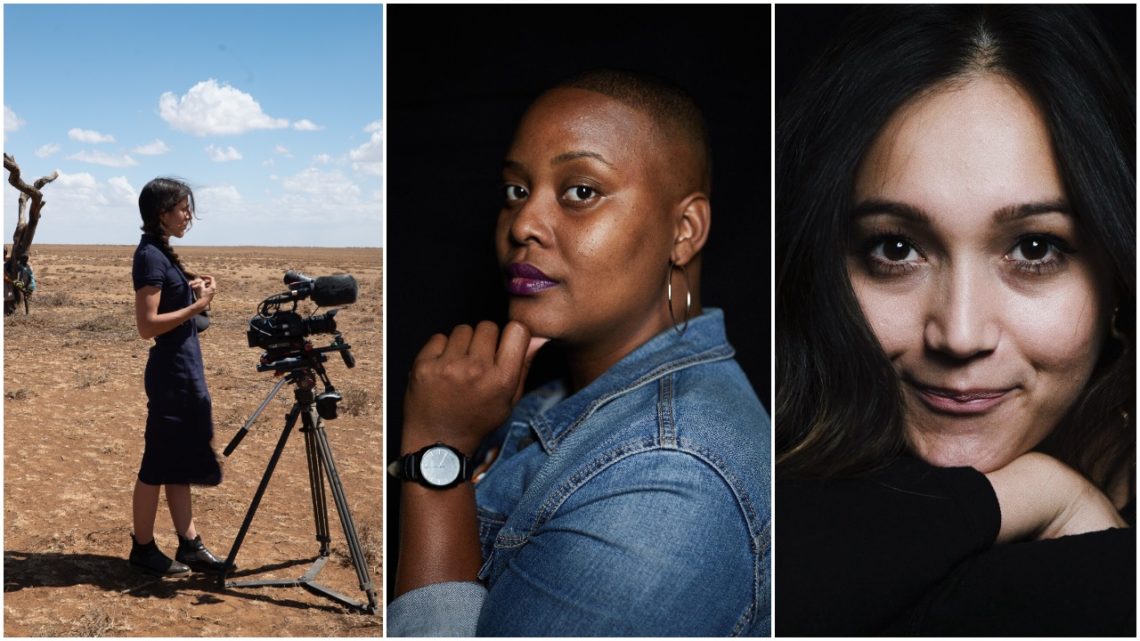
Daphne Matziaraki (‘16), Niema Jordan (MJ/MPH’16) and Bo Kovitz (’19)
Niema Jordan (MJ/MPH’16) was story producer, Bo Kovitz (’19) co-story producer and Daphne Matziaraki (‘16) a segment director on the docuseries “The Me You Can’t See”—exploring mental health and emotional well-being—directed by former documentary instructor Dawn Porter, EP’s Oprah Winfrey and Prince Harry, premiering May 21.
Documentary filmmaker and DP Luisa Conlon (’17) has been named a 2021 Livingston Award finalist for Excellence in International Reporting for “Across the Rio Grande: Crisis Inside the Border’s Largest Refugee Tent City,” for Vice News.
News From Our Investigative Reporting Program (IRP)
The IRP continues to churn out powerful investigative stories under the leadership of Prof. David Barstow, the Reva & David Logan Distinguished Chair in Investigative Journalism. This spring, the IRP teamed up with the PBS series FRONTLINE and ProPublica on “American Insurrection,” a documentary about the threat posed by militia groups, white supremacists and other extremist groups. The 90-minute documentary, which aired on April 13, featured in-depth reporting by alumna Gisela Pérez de Acha (’20) and two students, Kathryn Hurd (’21) and Ellie Lightfoot (’21) about a prominent leader of the anti-government Boogaloo Bois movement and his path to extremism. Pérez de Acha, Hurd and Lightfoot were interviewed on camera for the documentary. In addition, their 4,000-word story, “How an Active Duty Airman Tried to Start a Civil War,” was published on the FRONTLINE and ProPublica websites. Special thanks to lecturer David Thigpen for identifying this story last summer and providing key editorial guidance throughout the year.
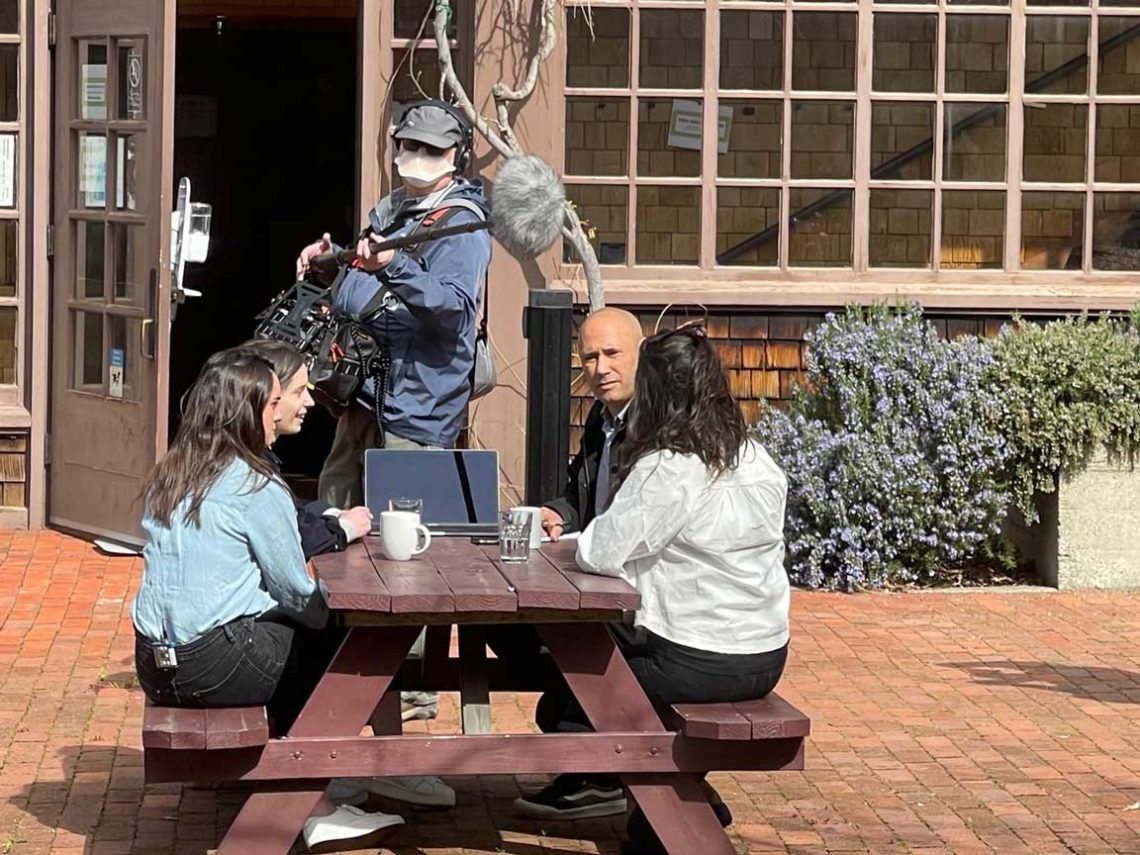
ProPublica’s A.C. Thompson interviews Gisela Pérez de Acha, Kathryn Hurd and Ellie Lightfoot in the North Gate Hall courtyard in March for “American Insurrection.” (Courtesy: Gisela Pérez de Acha)
IRP research assistant Julia Kane (’21) shared a byline with Inside Climate News reporter Sabrina Shankman (’09) in “Noxious Neighbors,” a deeply reported story about the potential health risks to millions of Americans living near bulk storage tanks that hold asphalt and heavy fuels. Together, they combed through thousands of documents to uncover how for at least a decade, the Environmental Protection Agency has known that the tanks emit harmful chemicals, yet has taken no action to mandate that companies report the emissions or measure them directly.
A generous grant from the SCAN Foundation has enabled the IRP to hire a small team of students to report rigorously on complex issues around aging in America. Among its published stories: a public radio piece about a family navigating the world of long-term care during the pandemic that aired statewide on The California Report Magazine by Brett Simpson (’21) and a story about the challenges getting the COVID vaccine to small residential care homes by Anne Marshall-Chalmers (’22) for the Los Angeles Times, with photos by Anne Daugherty (’21).
On the awards front: The national investigative series, “Mauled: When Police Dogs Are Weapons,” led by lecturer and Marshall Project reporter Abbie VanSickle with research by Michelle Pitcher (’21), won the White House Correspondents’ Association’s 2021 Katharine Graham Award for Courage and Accountability. It was also a 2021 finalist for the prestigious Goldsmith Prize for Investigative Reporting. The year-long project exposed the widespread use and abuse of police dogs across the U.S. Pitcher helped to assemble a national database of disparate records from reluctant police departments while working as an IRP research assistant. Also, the IRP-led investigation, “California’s Criminal Cops,” won the top award for investigative reporting at the Society of Professional Journalists’ Northern California chapter’s 35th Annual Excellence in Journalism Awards in February. This six-month collaboration with the Bay Area News Group exposed hundreds of current and former police officers with rap sheets across the state. More than a dozen alumni and students were involved in the project, including Robert Lewis (‘08), Laurence Du Sault (‘20), Katey Rusch (‘20) and Ali DeFazio (’20).
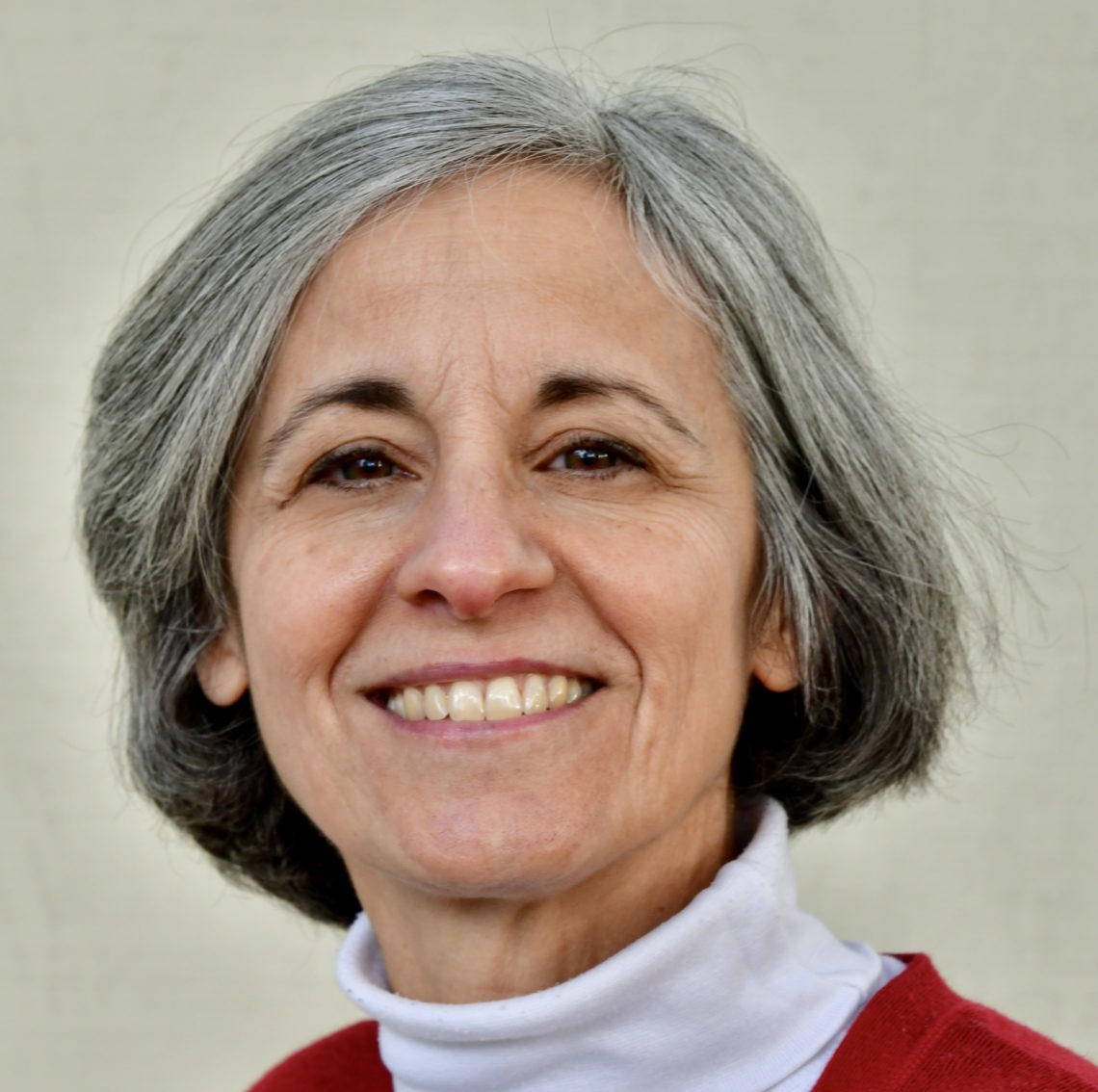
Christine Schiavo
In January, we were delighted to welcome Christine Schiavo as the IRP’s local news editor. She comes from The Morning Call in Allentown, Pennsylvania, where she directed several award-winning investigations as senior content editor. In her new role, she leads year-round coverage on the School’s two community news sites, Richmond Confidential and Oakland North. (The sites are typically dormant during the spring and summer months when the Introduction to Reporting classes are not in session.) Schiavo has already published more than a dozen stories with the help of Noah Baustin (’22) and Injeong Kim (’22) this semester. Check out their work, including Injeong’s interview with the family of a missing Richmond teen (which was viewed more than 9,000 times) and this stunning story by Noah about Oakland police salaries and overtime pay.
And it’s full-steam ahead this summer: The IRP is in the process of hiring more than 20 students to work as summer interns on projects that include aging in America, child welfare (with IRP reporter Garrett Therolf) and police misconduct (with IRP special projects editor Wesley Lowery). The program’s impactful work and efforts to train the next generation of investigative reporters would not be possible without the generosity of the MacArthur Foundation, the Reva & David Logan Foundation, and the SCAN Foundation. We are grateful for their steadfast support.
In Conclusion
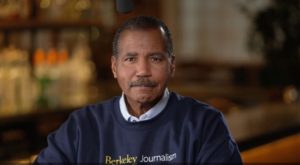 As we near the end of our fiscal year, we send our gratitude to everyone who has supported our School, and invite those who haven’t yet done so to contribute to our scholarship fund. “60 Minutes” correspondent and Advisory Board member Bill Whitaker (’78) is helping to lead this effort. Watch his video and donate today. So far we have raised enough money to fund five full scholarships for first-generation students in the Class of 2023.
As we near the end of our fiscal year, we send our gratitude to everyone who has supported our School, and invite those who haven’t yet done so to contribute to our scholarship fund. “60 Minutes” correspondent and Advisory Board member Bill Whitaker (’78) is helping to lead this effort. Watch his video and donate today. So far we have raised enough money to fund five full scholarships for first-generation students in the Class of 2023.
Wishing you and yours a safe and restorative summer ahead,

Geeta Anand
Dean and Professor
Robert A. Peck Chair
Berkeley Journalism
About this communique: News from the desk of Dean Geeta Anand is a quarterly email newsletter sent to alumni, donors, students, faculty, media partners and others in Berkeley Journalism’s broad community. If you’d like to follow ongoing developments in real-time, find us on Facebook, Twitter and Instagram. Have alumni news or accomplishments to share? Please send it, along with a high-res headshot to journalism@berkeley.edu. Are you hiring? Please reach out to career.services@berkeley.edu.
